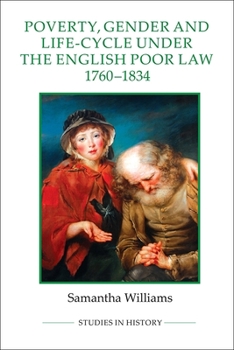Poverty, Gender and Life-Cycle Under the English Poor Law, 1760-1834
(Part of the Royal Historical Society Studies in History New Series)
Select Format
Select Condition 
Book Overview
Social welfare, increasingly extensive during the seventeenth and eighteenth centuries, was by the first third of the nineteenth under considerable, and growing, pressure, during a period when levels of poverty soared. This book examines the poor and their families during these final decades of the old Poor Law. It takes as a case study the experience of poor families in two Bedfordshire communities, Campton and Shefford, and contrasts it with that of other participants in parish politics, from the magistracy to the vestry, and from overseers to village ratepayers. It explores the problem of rising unemployment, the provision of parish make-work schemes, charitable provision and the wider makeshift economy, together with the attitudes of the ratepayers. Gender and life-cycle were crucial features of poverty: the lone mother and her dependent children, and the elderly, dominated the relief rolls. Poor relief might have been relatively generous but it was not pervasive, and it by no means approximated to the income of other labouring families
Format:Paperback
Language:English
ISBN:1843838664
ISBN13:9781843838661
Release Date:September 2013
Publisher:Boydell Press
Length:208 Pages
Weight:0.65 lbs.
Dimensions:0.4" x 6.1" x 9.2"
Customer Reviews
0 rating





